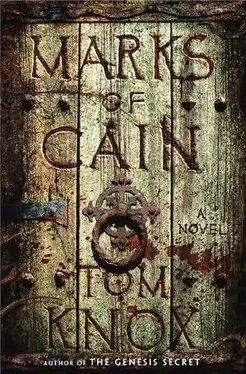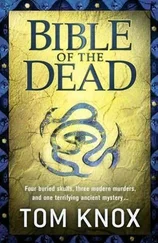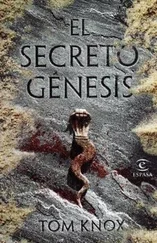Tom Knox - The Marks of Cain
Здесь есть возможность читать онлайн «Tom Knox - The Marks of Cain» — ознакомительный отрывок электронной книги совершенно бесплатно, а после прочтения отрывка купить полную версию. В некоторых случаях можно слушать аудио, скачать через торрент в формате fb2 и присутствует краткое содержание. Жанр: Триллер, на английском языке. Описание произведения, (предисловие) а так же отзывы посетителей доступны на портале библиотеки ЛибКат.
- Название:The Marks of Cain
- Автор:
- Жанр:
- Год:неизвестен
- ISBN:нет данных
- Рейтинг книги:4 / 5. Голосов: 1
-
Избранное:Добавить в избранное
- Отзывы:
-
Ваша оценка:
- 80
- 1
- 2
- 3
- 4
- 5
The Marks of Cain: краткое содержание, описание и аннотация
Предлагаем к чтению аннотацию, описание, краткое содержание или предисловие (зависит от того, что написал сам автор книги «The Marks of Cain»). Если вы не нашли необходимую информацию о книге — напишите в комментариях, мы постараемся отыскать её.
The Marks of Cain — читать онлайн ознакомительный отрывок
Ниже представлен текст книги, разбитый по страницам. Система сохранения места последней прочитанной страницы, позволяет с удобством читать онлайн бесплатно книгу «The Marks of Cain», без необходимости каждый раз заново искать на чём Вы остановились. Поставьте закладку, и сможете в любой момент перейти на страницу, на которой закончили чтение.
Интервал:
Закладка:
And so it went, and so it continued, and then the fog came. They'd been there for two days of increasing anxiety and it was windy and cold throughout; and then the weather worsened. The Swakopmund fog descended: the infamous mists of the Skeleton Coast.
It was like Scotland in December: thick and dismal, shrouding the gay little cakeshops in dankness, sending the lederhosened German tour groups into their warm snug hotels, veiling completely the black factory boats that floated inert on the cold Namibian sea; only the yellow-orange men sitting on their haunches seemed impervious: narrowing their sunburned eyes, and sitting in their cardigans and holey jeans, staring at the grey damp nothing. They looked like the Basque men, in berets, staring at the mountain fog in the villages of the high Pyrenees.
On the foggiest night of all, as they were getting truly desperate, when they were shivering their way along Moltkestrasse, they found a bar they hadn't seen before: Beckenbauer Bar.
It was tiny and gabled and Bavarian-looking, and it was noisy, even from fifty metres away. Keen to escape the shrouding dampness they stepped inside the bar, which was giddy and packed; people were singing in German and ordering steins of lager and clashing the steins together. Chortling.
Amy and David found a table in the corner and sat down, warm at last. A black waiter came over and he asked them, above the noise of the singing German voices, if they wanted anything.
David said, hesitantly: 'Ein bier…?'
The man smiled. 'It's OK. I speak English. Tafel or Windhoek?'
'Ah,' said David, slightly blushing. 'Tafel, I guess.'
Amy was staring, with an expression of perplexity, at the exuberant and warbling German men. She motioned to the barman as he turned to go. 'Excuse me?'
'Yes, miss.'
'Why…' She was talking quietly. 'Why are they so happy?'
The waiter half shrugged.
'I think it is Ascenscion Day. I believe.'
Amy frowned.
'Ascension Day, that's forty days after Easter, isn't it? Usually in May.' Her frown deepened. 'This is September.'
The waiter nodded.
'No, not Jesus. Hitler.'
32
Simon tried not to shout as he read the visitor's book: to shout in triumph. David's father had been here. His father had actually been here. Fifteen years ago. He'd worked out the same link. He was halfway through the same mystery.
The last thunderclap abated. And then Simon's excitement faded. So David's father, Eduardo Martinez, was here fifteen years back? So what? That didn't mean he found anything.
To search is to find?
Why the question mark? What did that mean? If Eduardo Martinez had actually found something surely he would have put To search is to find. Just that — with no question mark. But then, why did he leave a comment at all? He must have felt he was at least searching for something. It was no coincidence he'd been here.
Simon was glad when a buzzer sounded the monastic signal for dinner. He was hungry, as well as confused. And he could still hear the ceaseless prayer of his conscience: go home, go home, go home. Find Tim, find Tim, find Tim.
At the rasping sound of the buzzer the whole monastery had come alive. From all the concrete corners, from the chapel and the roof and the cells and the gardens, monks and pilgrims and retreaters were all gathering in the big refectory, to drink from jugs of local wine and eat salad and lamb from the long steel buffet.
Feeling an almost first-day-at-school bashfulness, Simon sat at the longest table with the most people. His shyness fought with his anxious need to get information. Quickly. He had one evening. Then leave before dawn. He wanted to drink wine. He drank water. Between courses he texted his wife: any news? She texted back: no news.
At the other end of the long table, the monks sat and ate. Some conversed with the visitors, some stayed quiet and contemplative; one bald monk in his sixties with a sorrowful face talked, very passionately, with a young blond man, evidently a visitor. The monk was in his ordinary day clothes like the other monks; the sad old monk seemed to be drinking a lot of wine.
Simon spoke with people on his own table. A Slovakian artist, seeking inspiration. A Belgian dentist having a religious breakdown. Two Danish students who were apparently here for a lark: the scary monastery that sent people mad! A couple of earnest Canadian pilgrims. Believers.
The storm had passed; blue and purple darkness enveloped the depths of rural France. Simon had finished his dinner and was again despairing. He had a few hours to go. He was sitting forward, feeling lonely, sipping coffee. Yet again he texted Suzie.
Sorry no news.
But then, as he sat there, hunched forward, muscles tensed, he overheard it, the telling phrase: Pius the Tenth.
The journalist edged slightly nearer this overheard dialogue, even as he stared resolutely ahead.
Two people were chatting next to him. A fortyish monk, and a pilgrim: an older woman. American, or Canadian maybe. He listened in.
'Brother McMahon has been here eight years now.'
'Uh-huh?'
'As I said, Miss Tobin, the previous librarian was…well…rather a bad influence. Member of the Society before they were excommunicated.
'Gotcha. And this was when? When you were a seminarian?'
'Yes. Many young monks trained here in the 1990s. But the librarian was like a malignancy, in his teaching. The Society had a lot of influence here, in those days. He taught injudiciously. From inappropriate texts and materials. But now we have Brother McMahon. And we are no longer a teaching institution. Would you care for some more wine?'
The woman proffered her glass. Their dialogue dwindled.
Simon finished his coffee, not even tasting it; he tasted a very small triumph instead. So that was it — the explanation. Tomasky had been here, an eager young Catholic seminarian. And he'd learned something from the librarian.
But what was it? What changed people? There were supposedly secrets in this monastery which could induce a severe religious militancy, even murderous violence.
And yet there was no sign of the archives themselves.
He stood up and got ready to leave the refectory — maybe he should do another search through the books in the library. Perhaps the archives were hidden in the books: in a foreign language. Greek. Arabic. Or in code?
Of course this was desperate, but he was desperate. He had one evening and that was that: go home and hug Conor and find Tim. Simon turned for the exit — and he saw the young blond visitor, the man who had been chatting with a monk, was now sitting at the long table, on his own.
Pensive.
What had the two of them been discussing so passionately? The man and the monk?
The journalist took the opportunity and extended a hand. The young man smiled cheerily.
'Guten tag. Julius Denk!'
'Sssimon ah…Edgar Harrison.'
A stupid mistake. But Julius Denk didn't seem to notice or care. He was animated — and yet distracted. His thin-rimmed spectacles reflected the lamplight. He spoke good English; he said he was a trainee architect from Stuttgart, interested in Le Corbusier. The journalist knew just enough about architecture, from his father, to sound like he was also an architect, albeit a pretty stupid one. They swapped opinions.
Then Julius talked of the balding monk: their conversation at dinner.
'That monk. Very unhappy. American Irish. He drinks. Has been here seven years.'
'Yea?'
'Ja. I think he is the archivist. He says he is having a crisis of faith. He is losing his faith in God. Not so good for a monk I think!' The young German laughed. 'I feel sorry for him you know. But he talk too much. The wine is good, nicht wahr?'
Simon agreed. With a pang of wild surmise. The archivist is losing his faith. Why?
Читать дальшеИнтервал:
Закладка:
Похожие книги на «The Marks of Cain»
Представляем Вашему вниманию похожие книги на «The Marks of Cain» списком для выбора. Мы отобрали схожую по названию и смыслу литературу в надежде предоставить читателям больше вариантов отыскать новые, интересные, ещё непрочитанные произведения.
Обсуждение, отзывы о книге «The Marks of Cain» и просто собственные мнения читателей. Оставьте ваши комментарии, напишите, что Вы думаете о произведении, его смысле или главных героях. Укажите что конкретно понравилось, а что нет, и почему Вы так считаете.












